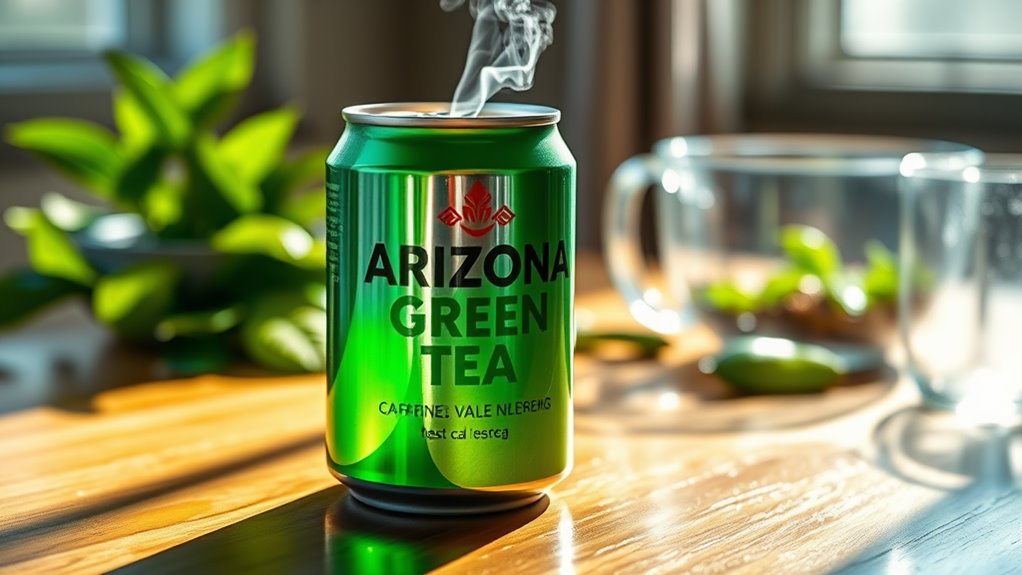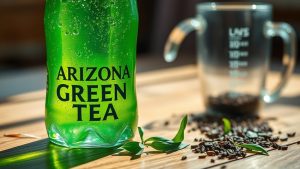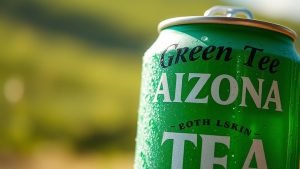
Arizona Green Tea contains about 7.5 mg of caffeine per 8 oz serving, which is much lower than brewed coffee's 95 mg per 8 oz. In a 23 fl oz can, you'll find approximately 22.5 mg of caffeine. This makes it a mild option for energy compared to sodas and coffee. However, be aware that each can also has 47-51 grams of sugar, which can impact your health. Learn more about how these elements interact and their effects.
Have you ever wondered how much caffeine is actually in Arizona Green Tea? If you're trying to figure out how this popular drink stacks up against other caffeinated beverages, you might be surprised by the numbers. A typical 8 oz serving of Arizona Green Tea contains about 7.5 mg of caffeine. However, the cans you usually grab from the store are larger—23 fl oz—so if you drink a whole can, you're looking at around 22.5 mg of caffeine. While this isn't a massive amount, it's vital to evaluate how it compares to other drinks.
In the caffeine race, Arizona Green Tea lags behind brewed coffee, which typically boasts around 95 mg of caffeine per 8 oz serving. Freshly brewed green tea also offers a higher caffeine content, clocking in at about 30-35 mg per serving. Even sodas like Coca-Cola have more caffeine, with approximately 39 mg in a 12 oz serving. For those who prefer black tea, Arizona's version contains 15 mg of caffeine per 8 oz serving. This comparison clearly shows that if you're looking for a significant energy boost, Arizona Green Tea isn't your best bet.
Now, let's discuss the sugar content. Each can of Arizona Green Tea contains a concerning 47-51 grams of sugar. This high sugar level can overshadow its caffeine benefits and lead to health issues like obesity and diabetes. While green tea generally provides health advantages due to its antioxidants, Arizona's version is highly processed, making it less nutritious than freshly brewed alternatives. Authentic green tea typically contains 30-35 mg of caffeine per serving, highlighting the difference in caffeine levels.]
The caffeine absorption in tea is different from coffee, largely due to the presence of L-Theanine, an amino acid found in tea. This component can slow the absorption of caffeine, resulting in a more sustained energy boost without the crashes associated with coffee. This makes Arizona Green Tea a decent option for a mild energy lift, especially if you appreciate its smooth flavor. But remember, this isn't a substitute for the more robust energy that coffee provides.
In terms of daily consumption, Arizona Green Tea can offer a moderate energy boost suitable for a laid-back lifestyle. The combination of caffeine and L-Theanine helps prevent those dreaded energy crashes. If you're looking for a low-caffeine alternative to traditional energy drinks, this might fit the bill. However, you should stay informed about its sugar content, as excessive sugar isn't a friend to your health.
Ultimately, while Arizona Green Tea offers some benefits, it's important to assess them against its high sugar content and lower caffeine levels compared to other beverages. If you're weighing it for a caffeine fix, be mindful of the overall nutritional profile and how it aligns with your health goals.
Conclusion
To sum up, Arizona Green Tea contains about 15-20 mg of caffeine per 8-ounce serving, making it a milder option compared to many energy drinks. While it won't give you the jolt of a triple espresso, it can still provide a gentle boost to keep you alert. So, next time you sip your iced tea while scrolling through social media, remember: sometimes, less is more—just like enjoying a classic vinyl record in a world of digital noise.



